 |
 |
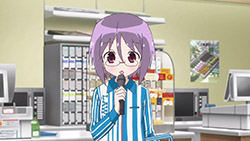 |
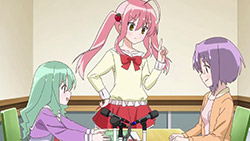 |
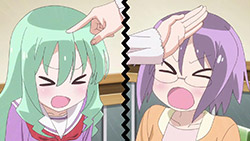 |
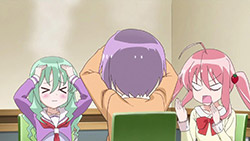 |
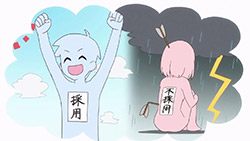 |
 |
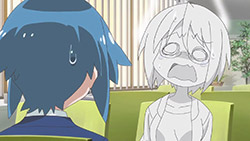 |
 |
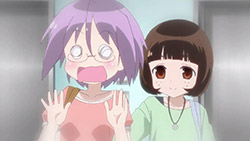 |
 |
 |
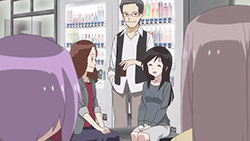 |
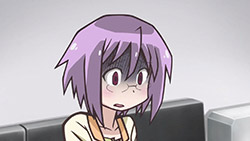 |
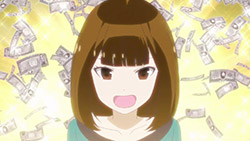 |
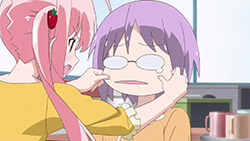 |
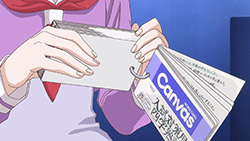 |
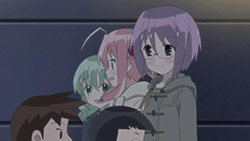 |
 |
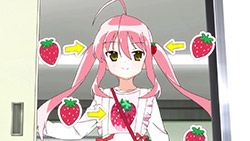 |
 |
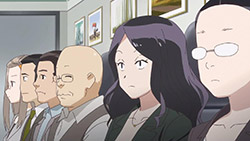 |
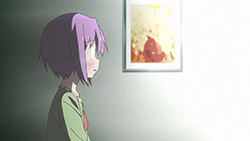 |
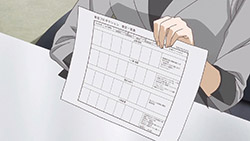 |
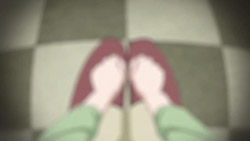 |
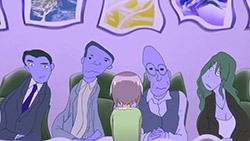 |
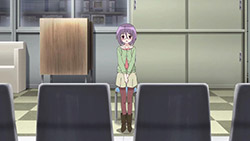 |
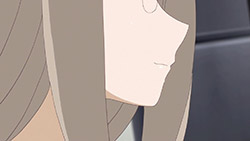 |
 |
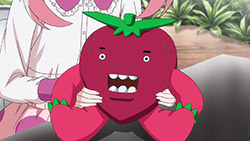 |
 |
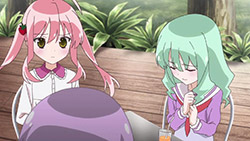 |
 |
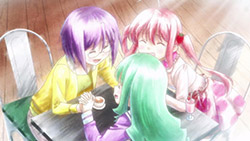 |
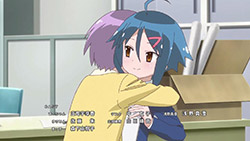 |
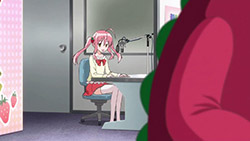 |
 |
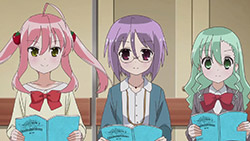 |
「査定」 (Satei)
“Assessment”
I actually mislead myself into thinking that last week was the finale, and was actually a bit surprised that Sore ga Seiyuu! would end on such an unequivocally happy note, but at the same time I could see how it could be appropriate. After watching Futaba beat herself up for the entire series perhaps we could just indulge in her having a genuinely successful moment. But since we do have an episode 13,more self-flagellation is in order. One last round of drama, coming up!
If Earphone’s big concert would have been the ‘climatic finish’, I suppose Futaba’s assessment would be the ‘retrospective finish’, with the interview and its implications being a very straightforward device to look back on the growth of our protagonist. I understand why Aozora Productions would have this assessment—a probation period of sorts, I suppose—but their actual process is something that I have conflicted feelings about. Sure, I understand that they’re not pulling any punches, and Sore ga Seiyuu! has never done that either, but a 6 v 1 panel? That’s some heavy handed intimidation there. I’m not sure if they ever intended an interview, or just wanted to bully their rookies into contrition. I suppose with Futaba’s low approval rating there was no way that her experience in there was going to be any less than, ‘why shouldn’t we sack you?’, but there must be more constructive ways to give negative feedback than this. This is what happens when you have an oversupply of labour, like in the seiyuu industry; feel free to treat your drones like trash. There are others to take their place.
At least Futaba pulled herself together for the generic, ‘where do you see yourself in the future?’ question, because that’s where her growth shows. Futaba’s always been a creature of self-doubt, and considering Sore ga Seiyuu‘s emphasis on small steps she’s hardly going to change now. But her Aozora Productions friend is right; Futaba’s wallowing in negativity is rude to those who have less. It’s one thing to be humble, but it’s another to lack perspective. Contrast Ichigo, who always seems to be emotionally healthier because while she’s only doing a bit better than Futaba, she still has enough pride to sustain herself. It’s about having a clear self-image (such is the irony of Ichigo’s character). Futaba allowing herself that modicum of ambition, to want be able to persist in the industry, is growth. Sure, she might never rise above mediocrity. But being able to maintain mediocrity for a long time is surely an achievement in itself.
And thus the ending: Futaba neither passes nor fails, she’s just persisted for another year. It’s a thoroughly humdrum kind of conclusion to the entire drama, and a bit of a status-quo ending, but I suppose it’s fitting for Futaba. Rin aces her entrance exams, Ichigo gets to voice a mutant strawberry (hey, some of those local mascots are a pretty big deal in Japan), but Futaba? Being in limbo is apparently already a win. Baby steps, baby steps. As long as Futaba persists, opportunities will come. How about that big announcement at the end? Is Earphones going on tour? Is it a hook for a potential season 2? Are they making an anime based on Earphones? (Woah, the meta). Even off-screen, the life of these seiyuu continue.
Full-length images: 21.
Epilogue:
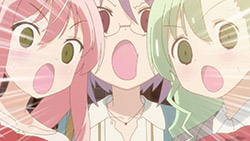 |
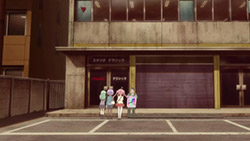 |
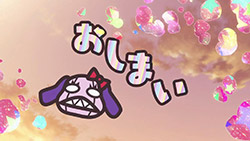 |
Final Impressions, Take Two
There’s something to be said about looking for sleeper anime each season, and I think that Sore ga Seiyuu! can rightfully be called one of them (although Stilts will no doubt tell you that he told you). I must admit that I didn’t have particularly high expectations for it myself, just an idle curiosity and a gut feeling that I might be pleasantly surprised. And, indeed, Sore ga Seiyuu! was everything I hoped for and perhaps more (time to feel smug again). It was never a high budget, blockbuster hit, sure, but that was never necessary for good anime. More important, I feel, is a clear understanding of what one is doing with their show and then back that up with clean execution. In that regard, Sore ga Seiyuu! was an incredibly solid show. Its aethetics were serviceable, its pacing never too fast or slow, and it always managed to maintain the correct balance of humour and seriousness. That last one is particularly important to note, because while Sore ga Seiyuu! is a comedy, it never downplays the hardships of the seiyuu life. So our protagonists (Futaba especially) always has it rather tough, but it never feels too heavy because the comedy—which approaches black comedy sometimes, but is quick to come back around—softens the blow. Sore ga Seiyuu! makes it look simple, but I think it actually takes a deal of skill to balance idealism and reality, to have our protagonists be optimistic but still be able to fail. I suppose the important part is that even if they do badly, they’re still doing better. This finale is that message in a nutshell. Futaba’s never going to break out and take the seiyuu world by storm. Nobody, including herself, has particularly high expectations for her. She’ll probably always be that panicky mess. But she’ll keep doing what she does. It’s the Seiyuu’s Life, alright.
If there’s one criticism I would make of Sore ga Seiyuu!, it’s that in its quest to keep itself grounded it also became just a tad too formulaic. Each week, one of our girls would face some trouble or doubt, they meet an industry veteran guest star, and they are inspired to tough it on. It is, I admit, quite an effective formula and the girls do grow at a steady (if slow) pace, so it wasn’t all that bad, but it did mean that episodes like 05 (where the cameo stuck around for longer and played a bigger part) and 09 (where it was the manager as protagonist with a seiyuu cameo) felt noticeably ‘fresher’. This adherence to the routine was probably routine, to drive home a very Japanese kind of moral. The younger generation follow in the experience of the elder, and thus grow. Rinse, and repeat. Only once does Sore ga Seiyuu! break from this, perhaps appropriately in this final episode where Futaba finds inspiration from youth (out-of-context youth though they may be). Otherwise, it’s all about treading the path of those who came before, even if that path is decidedly horrible—hardship builds character! Now go fetch me my switch so I can beat you with it.
I suppose it’s all very forgiveable since the cameos, as a whole, really were quite inspirational, and also rather interesting (and not something I expected coming into this show). Sore ga Seiyuu! was already quite educational about the various nuances of the voice industry, but the guest stars added an air of authenticity to the entire thing, and of course learning about their personal quirks was a bonus for their fans. I like to think that all the guest stars came on very willingly, because Sore ga Seiyuu! really is a love song to the entire industry, harsh though it may be, and does all seiyuu a lot of credit without ever being patronising or condescending. Nobody ever pats Futaba on the head and gives her superpowers. Nothing was whitewashed for Sore ga Seiyuu!. Yet it was, at it core, quite the charming show, full of optimism in the face of hardship, both true to life and true to spirit. Sure, Futaba never really got very far over 13 episodes, but looking at how genuinely happy she and her friends are about it, it’s hard not to be happy for them as well.
Our final guest star was the author of the source manga herself, Asano Masumi (if you wanted more, here’s Aice5 singing the Sore ga Seiyuu! ED). Asano-sensei’s ambition was to hit it rich, and while I don’t know how serious that one is (probably not very), I hope Sore ga Seiyuu! works out well for her. Even if it’s not the greatest pay-day, (though considering all the angles from which they’re monetising it, I’m sure it’ll be something), I’m still going to count Sore ga Seiyuu! as a sucess in its own right. Like Futaba herself, it never was the blockbuster of the season, and perhaps never shone as brightly as some other stars. But it had its own little ambitions, and I must say it has filled them quite adeptly. You don’t need more than that for good anime.
ED3 Sequence ~ Cameo Parade
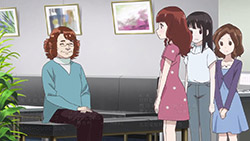 |
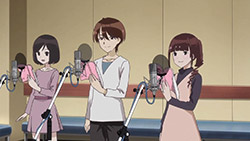 |
 |
 |
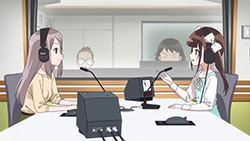 |
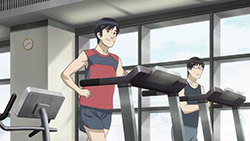 |
 |
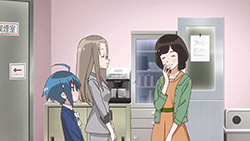 |
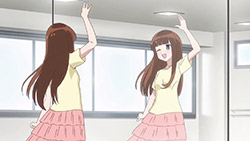 |
ED3: 「光の先へ」 (Hikari no Saki e) by Earphones (Takahashi Rie, Nagaku Yuki and Kouno Marika)

It was a cute little show and I enjoyed it. There are times I would have pause the show and do something else for awhile; I tend to get embarrassed on other characters behalves sometimes. I think it would have been a little better for me if Futuba had a little more confidence in her review, but having it in front of a whole panel can be nerve wracking.
Hopefully we will see more of this in the future.
I think the formula of learning a ‘lesson’ a week really helped at the end. In this finale Futaba didn’t get a single, vital piece of advice from a professional; instead, she succeeded by taking on the advice of friends, co-workers and the world around her (the two boys). The lattermost struck me as really important – an artist doesn’t necessarily get as much ‘luck’ as Futaba did in terms of having the right people say things to her at the right times. Noticing a little thing like the boys’ conversation and making their thoughts her own showed a growing sense of individualism in her career path. She’s becoming more discerning of what’s useful to her life as a Seiyuu, more inwardly aware of how to progress.
Her assessment may have been deferred, but given her development over the series, she might as well have passed.
Manager ep and episode 7 are my favourite episodes by far.
Ep 7’s Horie Yui cameo+that animated ending poking fun at the animation of the general “Tales Of” game series was so good.
I’ll miss listening to the “requested” ending songs, with a couple of highlights being Mizuki Nana’s Eternal Blaze from the Nanoha series and “Happy Material” from Mahou Sensei Negima. Those two were so nostalgic.
While I love an ultra-happy ending, I feel like this was more fitting. It’s the third route trope in a way, but since I don’t think getting differed for another year has ever been mentioned it was a nice change from in other shows when the audience knew it was coming or should be obvious. Too much happy would’ve felt off, and Futaba really only has just hit her stride. I never expected her to fail, but passing would’ve felt weird, too, so this was nice. Hope for the future, and more Konno hugs and Atsumari blushes!
I probably never would’ve checked out this show without prodding, so major thanks to Stilts and Passerby! The first couple episodes were a little awkward because I get embarrassed for people easily, but after you get used to it it was a really enjoyable show. Nice to see a drama/SoL mix that doesn’t suffer from a split-personality. Light and dark comedy can blend well.
P.S.: Konno spin-off. Someone, do it!
I agree that the 6-person panel is a bit too much, but let’s not forget that Aozora Pro also gives its employees a grace period of two whole years, while looking out for them, before subjecting them to this kind of pressure. It’s also mentioned that the company has a lot of seiyuu to look after, which lands them in a position where they would not be able to give enough jobs to everyone that comes to them. From the company’s PoV, it is better to weed out the under-performing so that the company can continue to survive in the industry, and with that, continue to serve its employees in its own way.
And I think it’s not good if a seiyuu can’t handle this kind of pressure. Seiyuu, especially the ladies, can get a lot of shit, from detractors as well as erstwhile “fans” who are actually more dangerous than their naysayers. Not to mention the paparazzi for those more high profile ones. One really needs a thick skin to even stand tall here, and those who can’t develop the mentality needed will just break down and be forgotten.
All in all, I feel that while the screening process does seem highhanded, it may be a form of tough love from the company. Do you have the means to carry on in this environment? Do you have the determination to carry on? If not, it’s better for everyone, especially the interviewees, to pursue another goal than to stay on only to be crushed under the gears of an unforgiving industry.
I think this may be why the story shows us Futaba’s gathering with her friends. Perhaps to show us, and Futaba, that it may not be a bad thing to leave the industry (or in Su-chan’s case, the company) if it doesn’t work out for them.
It is indeed a bit harsh. But I guess it’s a matter of perspective. The panel looked a lot like what you would expect for (for those who know the lingo) IBD interviews and assessment days…
And I see Shiraishi’s habit of giving people lots of cough drops is probably something that Masumin experienced herself =D
I loved the usual ED to this show; it felt like a little slice of web radio. It’s the only ED I would sometimes play 2-3 times just to make sure I caught everything.
All in all, a solid series I always looked forward to.
I loved this series. I never realized just how much goes into being a voice actress in anime and can now appreciate all the hard work the folks put in to bring so much pleasure to us fans all over the world.
My one complaint is that it seems Futaba was just too negative and in fact thats how the series ended. She didn’t get tossed to the curb but did not really get ahead either. Just got a one year reprieve from getting cut. Kinda a downer for all us fans of the series for sitting thru the series for 13 weeks.
As I said above, I actually liked that. As you said, this show has been REAL throughout its run, and since they made a point of mentioning how the assessment was based on the overall two years and how Futaba really didn’t have much more than bit-parts before, it didn’t feel right for them to just say “okay, good”. Much more realistic that she got an extra year since a lot of them probably realized she was just finding her groove and couldn’t really be assessed in full yet. They didn’t feel comfortable banking on a growth spurt at the end.
It is harsh, but it keeps with the reality of the show. Bold move, and I approve.
I thought it was a little ridiculous that when all the people in the room were bashing Futaba and intimidating her, they pretty much asked her why she was being so negative? Uhh, maybe because you’re putting her down? I’d feel like crap after that, too.
Good show, overall. Surprisingly harsh at times, but yeah, the comedy helped. Loved seeing all the seiyuu show up, especially Hocchan.
The ending played out 2/3 as I anticipated (i.e. happy ending for Rin & Ichigo) which is fine (this isn’t a grim-dark show). As for Futaba, I have mixed feelings on that. On the one hand, her extended trial period wasn’t the routine, 100% happy ending (i.e she’s an “associate” or whatever the term), but on the other hand it’s kind of splitting hairs as well. I’m sure she’ll gabatte her way to success given how the story played out over the cour = not much difference from my perspective. Then again, IMO it would have been out of place/off-putting had she been fired. So… IDK. Maybe it played out for the best after all.
Seiyuu falls under the “pretty good” category for me. Maybe even “good”. There were a number of positives such as good pacing, consistent execution, etc. One the better shows of the few I watched this season (or at least kept watching – dropped some). Still, the primary draw for me was the “documentary aspect” of the seiyuu industry. Definitely learned some things and found the information interesting.
That’s what really kept me watching. Honestly the show didn’t hold my interest much beyond that. Never really got immersed in the story or the characters for that matter. Both were “OK” (for characters Rin was my favorite of the three and Futaba my least favorite). Same goes for the cameos. Again, the term “OK” comes to mind. Mildly interesting at times (I did look up a couple of them), but not a significant factor. Perhaps I’m not a hardcore enough anime fan for that sort of thing to have a large impact. I get the impression the cameos were a big draw for many.
I’m also not sure if using the “cameo seiyuu of the week as mentor” formula every week was the best way to go about story-telling. That’s NOT to say don’t do it at all, but by the end, it felt a little repetitive. I would have preferred Futaba be a bit more self-reliant (and confident) as the season progressed. Comedy is subjective, but here again Seiyuu grades out as “OK”. There were a few moments I found funny (one episode in particular), but more exception than norm. Somewhat disappointing on that front, but JMO on that. However, I do think the show did a good job with handling comedy with more “serious” moments (IMO it never really got that serious), and overall maintained the proper tone/atmosphere for the type of show it was.
So yeah, pretty good show for me. No regrets at all watching it, but given how the documentary aspect was the draw in my case, not sure how much interest I have in a second season.
and as expected and again, STILTS PROVES HIMSELF RIGHT 😀
STILTS! do the “i told you so” dance right now!
anyway, this amazing informative anime is definitely a gem at its own right. its rare to find an animation studio, let alone this was done by GONZO who in the last 4 years or so filed for bankruptcy, willing to dive and risk some benjamins or yukichis on something unknown to most viewers like a seiyuu’s life. WELL, I COULD SAY THEIR GAMBLE SUCCEEDED. they caught my interest, so i took a ride with their boat and wow, what a pleasant journey it is. nothing beats a show that FEEDS YOUR MIND.
This sums up my own thoughts.
If there does happen to be a second season or spin-off, I would watch it.
https://randomc.net/image/Sore%20ga%20Seiyuu!/Sore%20ga%20Seiyuu!%20-%2013%20-%20Large%2040.jpg
WTF… I thought this series had ended on episode 12… LOOOOOOOOOOOL.